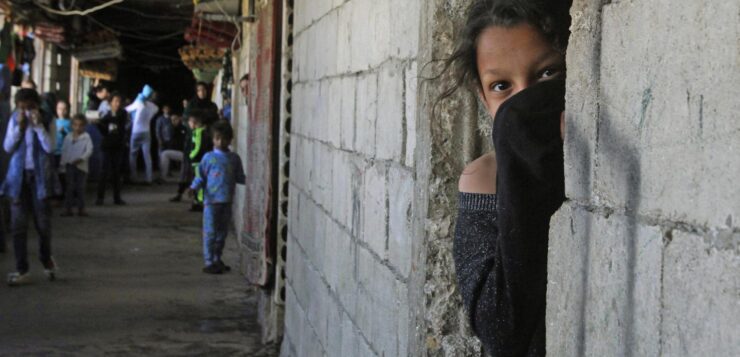COVID-19 is bringing a new threat to already battered countries – and makes delivering life-saving assistance even harder.
UNICEF
For the hundreds of millions of children living through conflict or in some of the world’s most fragile places, limited access to essential services has become a sad daily reality.
UNICEF was already working to improve healthcare, water and sanitation, access to learning and protection services for children struggling just to survive. But the COVID-19 pandemic presents yet another challenge to already battered and desperately overburdened health, education and social protection systems.
UNICEF and partners are on the frontlines, working to protect and improve the lives of every child – helping prevent the spread of COVID-19 and other diseases, and giving young people a chance for a more hopeful future.
Afghanistan

A child walks around a camp for internally displaced persons near Mazar-e-Sharif, northern Afghanistan.
Forty years of conflict and turmoil had already taken a devastating toll on Afghanistan and its children – around 3.7 million school-age children are out of school, some 600,000 Afghan children under the age of five are affected by severe acute malnutrition, and thousands have been killed by armed conflict over the past decade. But with a weak health system and limited capacity to deal with major disease outbreaks, the outbreak of COVID-19 could make a dire situation significantly worse for Afghan children.
The threat of a respiratory disease like COVID-19 is particularly acute in the overcrowded conditions typically found in camps and settlements for internally displaced persons. UNICEF Afghanistan is working with partners to deliver safe water and handwashing facilities, raising awareness through various activities focusing on prevention and providing other assistance for vulnerable populations.
South Sudan

A child is examined at a health care centre in South Sudan.
Years of conflict have severely disrupted critical social services in South Sudan. Around 4.1 million children are in need of humanitarian assistance, including an estimated 1.3 million children under five years-old who are expected to suffer from acute malnutrition in 2020.
Even as COVID-19 looms, it is essential to keep basic services going, ensuring children are not dying from conditions we know how to treat, even as we take precautions to prevent the virus spreading. Handwashing stations have been installed at UNICEF-supported outpatient centres treating malnutrition. The centres, which have implemented physical distancing measures, are also providing soap to contribute to a clean and hygienic environment at home.
Ukraine
With the conflict in eastern Ukraine entering its seventh year, and with COVID-19 spreading, the needs of children have become even more acute.
For many children, schools have played a critical role in providing at least some sense of stability and a normal life – a place to learn and spend time with friends. To help children across the country keep learning even if their school has closed due to COVID-19, UNICEF has been supporting the Ministry of Education and Science with distance learning options for students to ensure continuity and to help parents, caregivers and teachers access resources and support during quarantine. UNICEF Ukraine has also delivered hygiene kits to help educational facilities adhere to safety protocols.
Venezuela

Children learn how to wash their hands properly with soap and water during an activity supported by UNICEF in a school located on the outskirts of Caracas.
Children have been disproportionately affected by the unfolding economic and political challenges in Venezuela. Frequent interruptions in basic services, food shortages, and confinement measures have further undermined the ability of many Venezuelan families to meet their most basic needs. The COVID-19 pandemic compounds an already precarious humanitarian situation in the country, which has also recently seen the return of Venezuelans who migrated to other countries.
Since the start of the outbreak, UNICEF has been delivering essential medical supplies, as well as cleaning supplies and clean water to thousands of people in Venezuela. On 8 April, a shipment managed by UNICEF arrived in Caracas with vital supplies, including personal protective equipment kits for health workers on the frontline in the battle against COVID-19.
Syria

As the Syrian conflict entered its 10th year in March – and as children entered a second decade of life surrounded by war, violence, death and displacement – the region was grappling with the looming threat of COVID-19. The projected loss of jobs from lockdowns and businesses being shuttered in the Middle East and North Africa could see an additional 4 million children fall into poverty, according to the United Nations Economic and Social Commission for Western Asia, further straining already devastated health systems.
UNICEF has been working with partners to reach Syrian children and their families with prevention messaging around COVID-19, and to provide clean water and distribute hundreds of thousands of bars of soap to help reduce the risk of COVID-19. With the support of partners, UNICEF has also reached hundreds of thousands of Syrian refugees living in informal settlements through a door-to-door hand washing awareness campaign which included soap distribution.
Cox’s Bazar, Bangladesh

For the more than 850,000 Rohingya refugees from Myanmar living in the Cox’s Bazar camps in Bangladesh, physical distancing is easier said than done. But through UNICEF’s existing programmes, many Rohingya children have already been doing one of the most important things they can to protect themselves: washing their hands thoroughly and regularly.
UNICEF has reached hundreds of thousands of Rohingya children with lessons on good health and hygiene, and continues to distribute essential supplies like safe water and soap through its water, sanitation and hygiene (WASH) work.
Yemen

The threat posed by a pandemic like COVID-19 is particularly acute in the world’s largest emergency. More than 12 million children were already in need of humanitarian assistance in Yemen. The health system has been on the brink of collapse, with many families finding it difficult to access the healthcare they need to survive. The country is also wracked by food insecurity, an economic crisis, and vulnerable communities are grappling with outbreaks of dengue, acute diarrhoea and cholera.
The situation is dire, and the need to reduce the additional strain of COVID-19 spreading is urgent. UNICEF has been scaling up preparedness and response programmes across the country, including providing clean water to communities in need, and distributing basic hygiene kits – containing soap, towels, buckets and jerry cans – to empower and enable displaced families across the country to protect themselves.





